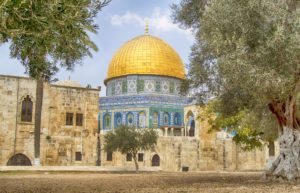The Prophet (ﷺ) Honesty Before Prophethood
Muhammad [pbuh], had no particular job at his early youth, but it was reported that he worked as a shepherd for Bani Sa‘d and in Makkah. At the age of 25, he went to Syria as a merchant for Khadijah [R]. Ibn Ishaq reported that Khadijah, daughter of Khwailid was a business-woman of great honor and fortune. She used to employ men to do her business for a certain percentage of the profits. Quraish people were mostly tradespeople, so when Khadijah was informed of Muhammad [pbuh], his truthful words, great honesty and kind manners, she sent for him. She offered him money to go to Syria and do her business, and she would give him a higher rate than the others. She would also send her hireling, Maisarah, with him. He agreed and went with her servant to Syria for trade. [Ibn Hisham 1/187,188]
When he returned to Makkah, Khadijah noticed, in her money, more profits and blessings than she used to. Her hireling also told her of Muhammad’s good manners, honesty, deep thought, sincerity and faith. She realized that she homed at her target. Many prominent men had asked for her hand in marriage but she always spurned their advances. She disclosed her wish to her friend Nafisa, daughter of Maniya, who immediately went to Muhammad [pbuh] and broke the good news to him. He agreed and requested his uncles to go to Khadijah’s uncle and talk on this issue. Subsequently, they were married. The marriage contract was witnessed by Bani Hashim and the heads of Mudar. This took place after the Prophet’s return from Syria. He gave her twenty camels as dowry. She was, then, forty years old and was considered as the best woman of her folk in lineage, fortune and wisdom. She was the first woman whom the Messenger of Allah [pbuh] married. He did not get married to any other until she had died. [Ibn Hisham 1/189; Fiqh As-Seerah p.59; Talqeeh Fahoom Ahl-al-Athar p.7]
[Above sections taken from Al-Raheeq Al-Makhtum, page 41, Issam Diab’s English Translation]
